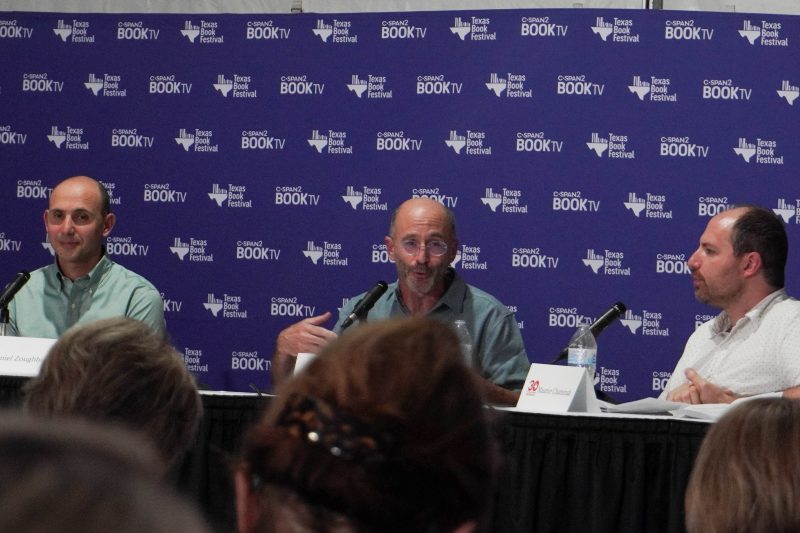Young Americans Could Change the U.S. Position in the Middle East, Authors Suggest
By Max Mazoch
Photography By Max Mazoch
Reporting Texas

Daniel Zoughbie. (lef), Robert Malley and Maurice Chammah speak about the Isreal-Palestine conflict at the Texas Book Festival.
Young Americans’ shifting opinion on the Israel-Palestine conflict could change U.S. involvement in the Middle East, a former U.S. diplomat said Saturday at the Texas Book Festival.
“We are now living in a period which is, to me, unique in the history of this country,” said Robert Malley, who served in the Clinton, Obama and Biden administrations as a Mideast diplomat. “Not that America’s going to wake up and suddenly become pro-Palestinian, but you’re hearing things.”
Sixty-one percent of Americans under the age of 30 sympathize with Palestine over Israel, according to a September poll by the New York Times and Siena University.
Younger voices, Malley said, can create “a moral discomfort with adults and parents who don’t see the world in the same way.”
Malley said growing awareness of the Middle East conflict among young people gives some hope to elect “new generation of leaders” that aren’t tied to the ideology responsible for decades of failed peace negotiations.
Malley now teaches at Yale University’s Jackson School of Global Affairs and is the co-author of “Tomorrow is Yesterday: Life Death and Pursuit of Peace in Israel/Palestine.”
“I’m not prepared to give up, because I teach now,” Malley said. “I see in the eyes of my students a different attitude than I was witnessing 10, 20, 30, 40 years ago.”
Malley’s book, published in September, comes two years after the Oct. 7, 2023, attacks by Hamas fighters inside Israel, killing 1,200 Israelis and taking 251 hostages. Israel responded with a U.S.-backed military campaign that killed over 69,000 Palestinians—including 20,000 children—and destroyed 84% of buildings in Gaza until a ceasefire was reached last month. Israel has continued to carry out airstrikes in Gaza despite signing the ceasefire killing over 200 Palestinians.
Malley and his book festival co-panelist Daniel Zoughbie, a historian and professor at University of California Berkeley, said personal relationships with Israelis have long influenced the actions of U.S lawmakers.
Zoughbie’s book, “Kicking the Hornet’s Nest,” documented how President Harry Truman’s business partner Eddie Jacobson’s Zionist views influenced Truman to recognize the state of Israel in 1947.
An audience member confronted the panel about the Israeli lobby’s role in the continued U.S. military support of Israel.
“It seems to me the biggest issue of the Israeli-Arab conflict is the grotesque failure of American politics to deal with the Israeli lobby,” the audience member said, receiving applause from the audience.
Zoughbie offered a different consideration.
“I think we need to ask ourselves not only what the pro-Israel lobby and Washington does, but why it has been actually working in a way against not only the United States’ interest, but also Israel,” Zoughbie said.
Malley said the Israeli influence on the U.S. Middle Eastern policy should be mitigated through awareness and political organization.
“The answer to an effective lobby is an effective counter lobby. The answer to an official you don’t like is Mamdani.” Malley said, referring to last week’s election of Zohran Mamdani as progressive mayor of New York City.
Zoughbie voiced his support for a two-state solution—where Israelis and Palestinians each have their own self-governing nations.
“I don’t see any scenario where we get a one-state solution,” Zoughbie said, “This problem is only going to be solved when the essential issue of nationalism is solved, and people are given two states with defined borders and sovereignty.”
Malley supported a two-state solution, but hesitated to call it a likely outcome because of past failures.
“When conditions were far, far more auspicious than they are today, for decades Israelis and Palestinians have been unable to agree on a two-state solution,” Malley said.
Malley told the audience it’s better to take time and create a thought-out solution since it’s impossible to solve the conflict anytime soon.
“From that,” Malley said, “sovereignty is much more fungible and porous than what had been imagined before.”